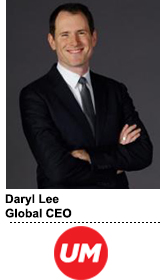
As clients tighten their belts and put accounts up for review, IPG media agency UM is focused on working strategically with data and analytics to grow clients’ businesses.
That often means sitting out a major pitch if it’s clear the focus will be on cost cutting.
“It goes against how agencies have been trained, which is to chase after everything. The bigger the whale, the more exciting the hunt,” said Daryl Lee, global CEO of UM. “But you have to find clients that are the right fit for your agency.”
That approach led UM through a flurry of change in its client roster throughout 2018, most notably in December, when the media agency lost its nine-year hold on the FCA Chrysler account to Publicis agency Starcom.
But UM balanced that loss with blue-chip wins like American Express, Quicken Loans and Henkel, thanks to its renewed commitment to strategy, Lee said. And with parent IPG’s $2.5 billion acquisition of Acxiom well under way, UM will have even more access to first-party data and the expertise to manage it to continue down this strategic path in 2019.
“As a brand you have to stick to your proposition,” Lee said. “We’re making a play and we’re not going to compromise.”
He spoke with AdExchanger.
AdExchanger: How big of a setback was losing Chrysler? Why did you lose the business?
DARYL LEE: It was a very tough decision. We took them on when they were in bankruptcy with the intended financial uncertainty of that. Clients have a right to choose whatever agency is right for them at that particular time. They chose not to go with a strategic solution and towards an efficiency play.
On the flip side, we won [other clients] with a consultative approach. It was a different pitch.
UM has a lot of longstanding clients, like Coca Cola. How do you hang onto them in this environment where media AORs are declining?
Some parts of a relationship need to be AOR. They need to be scoped and staffed properly. But if agencies depend on an AOR, they’re not going to be around in the next few years.
We balance the AORs with new projects that are not high revenue, but establish our strategic credentials. There are a lot of consulting projects. We’re not going to say we can digitize a client’s business, but when it comes to marketing segmentation, we are in that space.
Do you expect heavy review activity to continue in 2019?
Yes. More clients need to rethink their data infrastructure, and media is the forcing mechanism for that. There will be an equal amount of people putting media up for review because their businesses are suffering. DTC brands are eating their market share and they need to find growth.
How are you navigating consolidation in the media industry?
Media owners [are] going through massive changes, like Turner being pulled into AT&T.
The thing that’s going to be challenging is clients want more integration, collaboration and speed, so we actually don’t have time for people to get their houses in order.
I think there [will be] an inflection point this year where data will be the currency around all media. Acxiom will be important. They already have those preexisting pipes. Their ability to help us create and validate high value audiences and activate them [is] important.
Media owners are making claims around targeting. Xandr is interesting because there is a data source there and it is ethical [and] high-caliber. We can match and execute Acxiom segments. But [networks are] still building inventory pools and distribution networks. The disruption has happened conceptually. The question is, how quickly can the technology catch up?
How will IPG owning Acxiom change the services you can offer your clients?
Acxiom gives us the ability to do deeper audience segmentation [and] scale that level of precision across all media. And that’s just the beginning. We can create brand data co-ops with clients who are not in competitive space. If they pool their data together they can do really interesting things.
For example, Hulu and Spotify went to market together with a promotion where college students could get a bundled price. If there had been a data co-op, we could not just create a one-off promotion, but a joint database to prospect subscribers together. You could imagine a retailer and a beauty brand or a CPG doing something similar.
This interview has been edited and condensed.
This post was syndicated from Ad Exchanger.


More Stories
Thirst Trap Ahead: Progressive Says Drive Safely Around Calvin Klein’s Bad Bunny Billboards
People Are Surprised JCPenney Is Trendy. Its Comeback Ads Challenge That.
Special PR makes Global PR Agency of the Year shortlist